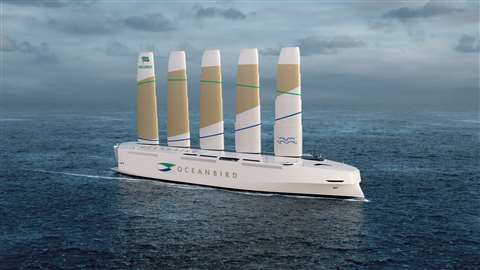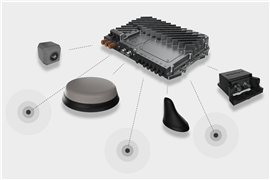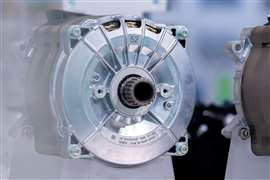Alfa Laval, Wallenius to develop modern wind propulsion
29 June 2021
First project will be transatlantic car carrier
Alfa Laval and Wallenius said they will join forces on the development and realization of technology for fully wind-powered vessel propulsion.
The companies have collaborated previously on PureBallast, which is one of today’s leading solutions for ballast water treatment. Through AlfaWall Oceanbird, they will pursue an innovative means of wind propulsion based on telescopic wing sails. This solution could reduce emissions by 90% on the largest ocean-going vessels. The AlfaWall Oceanbird joint venture is subject to customary merger clearance from relevant regulatory authorities.
“Wind has a key role to play in decarbonizing the marine industry,” said Peter Nielsen, Business Unit President, Alfa Laval Marine Division. “Together with Wallenius, we will harness this abundant natural force to meet both climate needs and those of maritime business.”
“Oceanbird wing sail technology will be not only an elegant solution, but also a powerful driver of positive change,” said Per Tunell, COO Wallenius Marine and future Managing Director of AlfaWall Oceanbird.
Though designed for wind propulsion, the Oceanbird technology has more in common with modern planes than traditional sailing vessels, the companies said. It comprises an array of 80-m rigid wing sails, built from steel and composite materials, that generate forward movement instead of vertical lift. These wing sails will be able to turn 360° to make optimal use of the wind.
 Oceanbird is a new concept that makes it possible to harness the wind to power the largest ocean-going vessels, the ones transporting heavy cargo over long distances for long periods of time.
Oceanbird is a new concept that makes it possible to harness the wind to power the largest ocean-going vessels, the ones transporting heavy cargo over long distances for long periods of time.
The technology will be valid for any vessel type, but it will be implemented first on a transatlantic car carrier. Able to carry 7000 cars, the vessel will be 200 m long and will cross the Atlantic in 12 days when sailing at an average speed of 10 knots. AlfaWall Oceanbird will focus primarily on the vessel’s technical sailing aspects, such as the vessel control system that will steer the wing sail operation. To be able to get in and out of harbors – and as a safety measure – the vessel will also be equipped with an auxiliary engine.
“The wing sails are up to 80 m tall and have a telescopic construction,” said Nielsen. “Besides adjusting to catch the wind, they can be lowered to pass under bridges, to handle harsh weather conditions or for maintenance. Because they will interact with the hull in a sophisticated way, they will also require intelligent control.”
The AlfaWall Oceanbird joint venture comes at a critical point for the marine industry, which is responsible for around 2–3% of global greenhouse gas emissions. With the intent of reducing greenhouse gases related to shipping by at least 50% by 2050 compared to 2008 levels, IMO has set a goal to cut CO2 emissions from international shipping by 40% by 2030. Alfa Laval and Wallenius are committing to decarbonization targets beyond these levels, as are many other companies and a range of countries.
“We cannot wait until the end of the century to phase out fossil fuels,” said Tunell. “We must create realistic alternatives, including the infrastructure for delivering and supporting them. Wallenius is committed to wind propulsion, and we know from the experience with PureBallast that Alfa Laval can help us make it a global reality.”
POWER SOURCING GUIDE
The trusted reference and buyer’s guide for 83 years
The original “desktop search engine,” guiding nearly 10,000 users in more than 90 countries it is the primary reference for specifications and details on all the components that go into engine systems.
Visit Now
STAY CONNECTED




Receive the information you need when you need it through our world-leading magazines, newsletters and daily briefings.
CONNECT WITH THE TEAM













